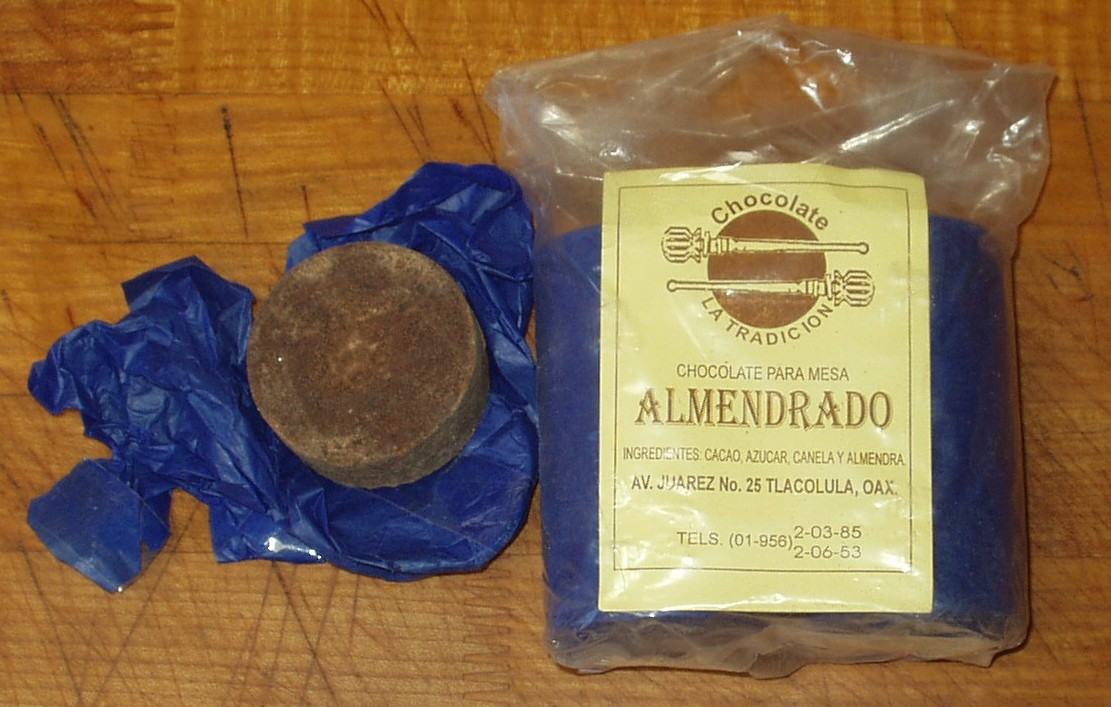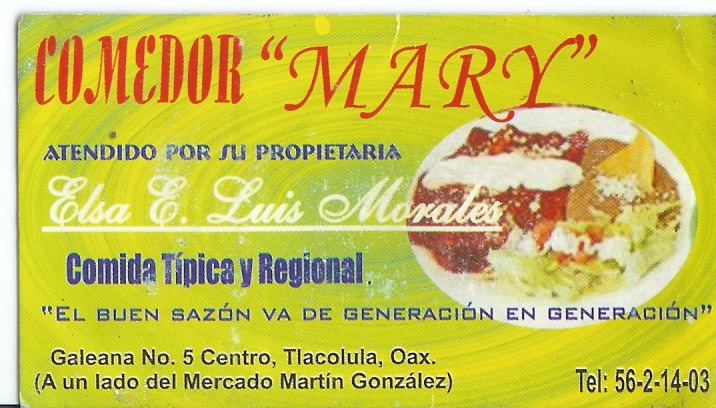S-17. Dialogue 4. At the Comedor Mary
After leaving the animal market, Juan Diego takes Megan to the Comedor Mary, a cafe near the center of the market in Tlacolula.

Fot Teiby. The Comedor Mary, near the market in Tlacolula.
| Dizhsa |
Ingles | Xa Rni Buny Ra Dizh | |
|
Jwanydyau: |
Comedor ren ryulaza riedtauwa. |
I like to come to eat at this café. |
[comedoor re’nn ryu’làa’za’ rìe’dta’uwa’] |
|
Megan: |
Uas nizh rdia ni rtorëng re. |
What they sell here smells delicious. |
[ua’s nìi’zh rdììa’ nih rtòo’rëng rèe’] |
|
Jwanydyau: |
Gyo subgaën rega. |
Let’s sit right here. |
[gyo’oh subga’-ëhnn rèe’gah] |
|
Megan: |
Yo. |
Okay. |
[yòòo’] |
|
A waitress (meser) comes to tell them the menu and take their order. She speaks in Spanish. |
|||
|
Meser: |
Hay enchiladas, enfrijoladas, higaditos, caldo de pollo… |
There are enchiladas, enfrijoladas, higaditos, caldo de pollo… |
|
|
Megan: |
Xi naëb la? |
What did she say? |
[xi nnah-ëhb làa?] |
|
Jwanydyau: |
Queity gucbeyu xi mniëb e? |
Didn’t you understand what she said? |
[que’ity guhcbèe’yuu’ xi mnìi’-ëhb èee?] |
|
Xiazh, queity rgweyu Dizhtily e? |
What, you don’t speak Spanish? |
[xiahzh:, que’ity rgwèèe’yuu’ Dìi’zhtiilly èee?] |
|
|
Megan: |
Tegwag. |
Nope. |
[tèe’gwahg] |
|
Jwanydyau: |
Zicy naëb, xi yquinyyu? |
She said, what are you going to eat? |
[zi’cy nnah-ëhb, xi yquììi’nyyuu’?] |
|
Nu enchiladas — aty nanyu xii… |
There are enchiladas — but you know what they are… |
[nu’uh enchiladas a’ty nàannyuu’ xi’ìi’…] |
|
|
Megan: |
Ajy |
Yes. |
[a’jy] |
|
Jwanydyau: |
Enfrijoladas na guet ni nu lainy bzya niu. |
Enfrijoladas are tortillas that are in a bean sauce. |
[enfrijoladas nàa gueht nih nu’uh làa’iny bzyàa’ nìu] |
|
Megan: |
Nizhi e? |
Are they good? |
[nìi’zhih èee?] |
|
Jwanydyau: |
Ajy… Caldo de pollo na cald budy. |
Yes… Caldo de pollo is chicken soup. |
[a’jy… caldo de pollo nàa ca’lld bu’uhdy] |
|
Megan: |
Yo… chiru higadito a, xii? |
Okay… and what about higadito, what’s that? |
[yòòo’… chiru’ higadito àa’, xi’ìi’?] |
|
Jwanydyau: |
Ni na gyixeiny. |
Like, higaditos. |
[nih nàa gyix:e’ehiny] |
|
Megan: |
A — ni bdauwën chi bluazh clas xte Dizhsa bdubiaz. |
Ah — we ate that when the Zapotec class was over last year. |
[àaa — nii bdau’wëhnn chih bluhahzh: cla’s x:tèe’ Dìi’zhsah bdubiihahz] |
|
Jwanydyau: |
Xi yquinyyu na? |
So what are you going to eat? |
[xi yquììi’nyyuu’ nah?] |
|
Megan: |
Rcaza gauwa enfrijoladas don cataly nizhi! |
I want to eat enfrijoladas to see how good they are! |
[rcàa’za’ ga’uwa’ enfrijoladas do’onn cata’lly nìi’zhih!] |
|
Jwanydyau: |
Asy a byulazyui. |
You’ll like them. |
[a’sy a byu’lààa’zyuu’-ih] |
|
Naa zicygagza, niegza gauwa. |
And the same for me, I’ll have them too. |
[nàa’ zi’cygahgza’, nìegza’ ga’uwa’] |
|
|
He speaks in Spanish to the waitress, who has been waiting patiently. |
|||
|
Vamos a ordenar dos enfrijoladas con dos tazas de chocolate. |
We will have two enfrijoladas with two cups of hot chocolate. |
||
|
The waitress leaves, and Juan Diego turns again to Megan. |
|||
|
Mnabagzaga nax yquinyyu. |
I also ordered hot chocolate for you to drink. |
[mnàa’bahgzaga’ nnahx: yquììi’nyyuu’] |
|
|
Megan: |
Xtyozën yu biedneyu naa re chiru mnabyu ni ydauwën. |
Thank you for bringing me here and for ordering what we’re going to eat. |
[x:tyoozëhnn yuu’ bìe’dnèeyuu’ nàa’ rèe’ chiru’ mnààa’byuu’ nih ydau’wëhnn] |
|
Per na rcaza ynia yu ysaguelyu queityru ynidiyu naa “yu”, tyen rrilua sangwalyën rac. |
But now I want to ask you to please not say “yu” to me any more, because I think we’re the same age. |
[pehr nah rcàa’za’ ynniìa’ yuu’ ysaguehllyuu’ que’ityru’ ynnìi’di’yuu’ nàa’ “yuu'”, tye’nn rriluùa’ sa’ngwaalyëhnn rahc] |
|
|
Rcaza yniyu naa “liu”! |
I want you to say “liu” to me! |
[Rcàa’za’ ynnììi’yuu’ nàa’ lìu’!] |
|
|
Jwanydyau: |
Cwana, yu zhi, bal zicy rniyu zhi zicy gac… |
I don’t know, it’s up to you, if you say so, that’s how it will be… |
[cwa’anna’ yuu’ zhi’ bàall zi’cy rnnììi’yuu’ zhi’ zi’cy ga’c…] |
|
The waitress brings their hot chocolate. |
|||
|
A nax a bzeny! |
The chocolate has arrived! |
[a nnahx a bzehnny!] |
|
|
Gyo ydeën nax. |
Let’s drink chocolate. |
[gyoo’oh ydèe’-ëhnn nnahx] |
|
|
Megan: |
Yo. |
Okay. |
[yòòo’] |
|
Dizh beyu! |
Cheers! |
[dìi’zh bèe’yuu’!] |
|
|
Jwanydyau: |
Yac — dizh beu! |
No — cheers [inf.]! |
[ya’c — dìi’zh bèu’!] |
|
Megan: |
Yo — dizh be Dyoz! |
Okay — cheers! |
[yòòo’ — dìì’zh bèe Dyooz!] |

Fot Tyop. Drinking chocolate is sold in solid cakes in the market in Tlacolula.
Ra Dizh
a [a] (used before some subjects) (as in a nax a bzeny “the chocolate has arrived”)
asy a byulazyui [a’sy a byu’lààa’zyuu’-ih] you’ll like it, you’ll like them
aty [a’ty] but (as in aty nanyu xii… “but you (form.) know what it is”)
bal zicy rniyu zhi zicy gac [bàall zi’cy rnnììi’yuu’ zhi’ zi’cy ga’c] if you (form.) say so, that’s how it will be
bdauwën [bdau’wëhnn] “we ate” (irregular form of rau)
be [bèe] see dizh be Dyoz
beu [bèu’] see dizh beu
beyu [bèeyuu’] see dizh beyu
biedne [bìe’dnèe] perf. of riedne
byulazyui [byu’lààa’zyuu’ih] see asy a byulazyui
bzya niu [bzyàa’ nìu] bean sauce
cataly [cata’lly] see don cataly nizhi
clas [cla’s] class
comedor [comedoor] café; small informal restaurant
cwana [cwàanna’] I don’t know
dizh be Dyoz [dìi’zh bèe Dyooz] cheers (response to dizh beu or dizh beyu)
dizh beu [dìi’zh bèu’] cheers (toast, when drinking — used to inf.)
dizh beyu [dìi’zh bèeyuu’] cheers (toast, when drinking — used to form.)
don cataly nizhi [do’onn cata’lly nìi’zhih] to see how good (how delicious) it is
gau [ga’u] irr. of rau § gauwa [ga’uwa’] “I will eat”; ydauwën [ydau’wëhnn] “we will eat”
gucbe [guhcbèe’] perf. of racbe
gyixeiny [gyix:e’ehiny] higaditos (Oaxacan dish made with eggs, vegetables, and meat)
gyo [gyoo’oh] let’s (followed by irr.) (as in gyo ydeën “let’s drink”)
gyo subgaën [gyoo’oh subga’-ëhnn] let’s sit down
la [làa] (added at the end of some questions; makes them seem more polite) (as in xi nab la? “what did she say?”)
liu zhi [lìu’ zhi’] see yu zhi
na [nah] so, then
nan [nàann] knows
ni [nih] what, the thing that (as in ni rtorëng re “what they sell here”)
niegza gauwa [nìehgza’ ga’uwa’] I’ll have them (to eat) too
niu [nìu] see bzya niu
nizh rdia [nìi’zh rdììa’] smells delicious
queityru [que’ityru’] no longer, not any more
racbe [rahcbèe’] understands § perf. gucbe (as in queity gucbeyu ni mniëb e? “don’t you understand what she said?”)
rau [ra’uh] eats § irr. gau [ga’u]; bdauwën [bdau’wëhnn] “we ate”; ydauwën [ydau’wëhnn] “we will eat”
rdia [rdììa’] see nizh rdia
rega [rèe’gah] right here
ria [rdìi’ah] drinks § ydeën [ydèe’-ëhnn] “we will drink”
riedtau [rìe’dta’uh] comes to eat § riedtauwa [rìe’dta’uwa’] “I come to eat”
riedne [rìe’dnèe] brings § perf. biedne
rluazh [rluhahzh] finishes, gets over, gets finished (as in ni bdauwën chi bluazh clas xte Dizhsa bdubiaz “we ate that when the Zapotec class was over last year”)
rnab [rnààa’b] orders (something) (in a restaurant) § rnabag [rnàa’bahg] “also orders”
rni [rnnììi’] says to, asks § rniëb [rnnìi’-ëhb] “he (resp.) says”; ynia [ynniìa’] “I will say”
rquiny [rquììi’ny] eats, drinks (resp. or form. subject)
rzubga [rzubga’ah] sits, sits down (CB verb) § irr. subga [subga’ah]
sa ngwalyën rac [sa’ah ngwaalyëhnn rahc] we’re the same age, our ages are the same
subga [subga’ah] irr. of rzubga
tegwag [tèe’gwahg] no, nope
xiazh [xi-ahzh:] what?! (introduces a disbelieving question)
xii [xi’ìi’] what it (dist.) is, what is it (dist.)
ydauwën [ydau’wëhnn] “we will eat” (irregular form of rau)
ydeën [ydèe’-ëhnn] “we will drink” (irregular form of re)
yu zhi [yuu’ zhi’] it’s up to you (form.) § liu zhi [lìu’ zhi’] (inf.)
zicy [zi’cy] thus, this way (see zicy na, bal zicy rniyu zhi zicy gac)
zicy na [zi’cy nnah] says, said (used before a quotation, as in zicy nab, xi quinyyu? “she said, what are you (form.) going to eat?”)
zhi see yu zhi, bal zicy rniyu zhi zicy gac
Xiëru Zalo Ra Dizh
Once again, there are a number of verbs in the vocabulary that don’t follow the rules you’ve learned so far (though you’re learning more with each unit!). You can check the Valley Zapotec Verb Charts to learn more about other forms of these verbs.


